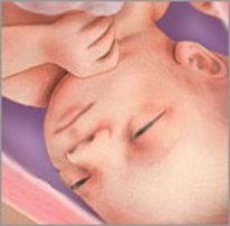Medical expert of the article
New publications
Pregnancy: 34 weeks
Last reviewed: 08.07.2025

All iLive content is medically reviewed or fact checked to ensure as much factual accuracy as possible.
We have strict sourcing guidelines and only link to reputable media sites, academic research institutions and, whenever possible, medically peer reviewed studies. Note that the numbers in parentheses ([1], [2], etc.) are clickable links to these studies.
If you feel that any of our content is inaccurate, out-of-date, or otherwise questionable, please select it and press Ctrl + Enter.

How the child grows:
Your baby weighs almost 4 pounds and is 18 inches long. His subcutaneous fat helps regulate body temperature after birth. His skin is smoothing out, and his central nervous system and lungs are continuing to develop. If you were worried about a premature birth, you'll be pleased to know that babies born between 34 and 37 weeks with no underlying health issues are not at risk.
Important: Each baby's development is unique. Our information is designed to give you a general idea of fetal development.
Changes in the expectant mother
This week, you'll notice increased fatigue again, although perhaps not as intense as during the first trimester. Your fatigue is understandable, given the physical exertion and restless nights. Now is the time to slow down a bit and conserve energy during the workday. If you've been sitting or lying down for a long time, avoid making sudden movements to avoid dizziness.
If you notice itchy red bumps or welts on your stomach, thighs, and buttocks, it could be a symptom of pruritic papulovesicular dermatitis, which affects up to 1% of pregnant women. It’s not dangerous, but it can be uncomfortable. See your doctor to make sure it’s not something more serious that needs treatment. Also, make sure you’re not experiencing intense itching all over your body, as this could indicate a liver problem.
3 questions about... cesarean section
- Who is susceptible to cesarean section?
Approximately 30 percent of pregnant women in the United States give birth by cesarean section. In some cases, the surgical method of delivery is planned in advance; in others, it is caused by unforeseen complications.
- For what reasons is a cesarean section performed?
An unplanned cesarean delivery can occur for many reasons: the cervix stops dilating, the baby stops moving through the birth canal, or the baby's heartbeat raises concerns for the doctor. A planned cesarean section may be recommended if:
- You have had a previous cesarean section with a "classic" vertical uterine incision or more than one incision. (If in the past, you had one horizontal incision, you can now have a vaginal birth after a cesarean section.)
- You have had another type of invasive uterine surgery, such as a myomectomy (surgical removal of fibroids).
- You are pregnant with more than one child.
- The child's size is larger than normal.
- The fetus is in a breech or transverse presentation.
- You have placenta previa.
- The baby has developed a condition that could be dangerous during vaginal delivery.
- You have HIV and blood tests done late in pregnancy show that you have a high viral load.
- How does a cesarean section work?
Typically, your partner can be present during the surgery. The doctor will insert a tube to drain urine during the procedure and begin administering anesthesia. You will not be able to watch the procedure, but once the necessary incisions have been made and your baby is born, the doctor will place your baby on your chest briefly and the pediatrician will examine your baby. After the doctor examines your baby, your partner will be given the baby while you receive your stitches. This part of the surgery usually takes about 30 minutes, after which you can return to the recovery room to hold and feed your baby.
This week's activity: Make a contingency plan. You may go into labor prematurely or develop complications that require a longer hospital stay. Make sure your older children are supervised and your pets are fed and exercised.


 [
[